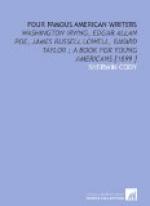The journey was indeed to Taylor a serious thing. “It did not and does not seem like a pleasure excursion,” he writes; “it is a duty, a necessity.”
On the 1st of July, 1844, Taylor and his two companions embarked on the ship “Oxford,” bound for Liverpool. They had taken a second-cabin passage, the second cabin being a small place amidships, flanked with bales of cotton and fitted with temporary and rough planks. They paid ten dollars each for the passage, but were obliged to find their own bedding and provisions. These latter the ship’s cook would prepare for them for a small compensation. All expenses included, they found they could reach Liverpool for twenty-four dollars apiece.
At last they were actually afloat. “As the blue hills of Neversink faded away, and sank with the sun behind the ocean, and I felt the first swells of the Atlantic,” he writes, “and the premonitions of seasickness, my heart failed me for the first and last time. The irrevocable step was taken; there was no possibility of retreat, and a vague sense of doubt and alarm possessed me. Had I known anything of the world, this feeling would have been more than momentary; but to my ignorance and enthusiasm all things seemed possible, and the thoughtless and happy confidence of youth soon returned.”
The experiences of the next two years he has also told briefly and tersely. “After landing in Liverpool,” he says, “I spent three weeks in a walk through Scotland and the north of England, and then traveled through Belgium, and up the Rhine to Heidelberg, where I arrived in September, 1844. The winter of 1844-45 I spent in Frankfurt on the Main [in the family in which N.P. Willis’s brother Richard was boarding], and by May I was so good a German that I was often not suspected of being a foreigner. I started off again on foot, a knapsack on my back, and visited the Brocken, Leipsic, Dresden, Prague, Vienna, Salzburg, and Munich, returning to Frankfurt in July. A further walk over the Alps and through Northern Italy took me to Florence, where I spent four months learning Italian. Thence I wandered, still on foot, to Rome and Civita Vecchia, where I bought a ticket as deck-passenger to Marseilles, and then tramped on to Paris through the cold winter rains. I arrived there in February, 1846, and returned to America after a stay of three months in Paris and London. I had been abroad two years, and had supported myself entirely during the whole time by my literary correspondence. The remuneration which I received was in all $500, and only by continual economy and occasional self-denial was I able to carry out my plan. I saw almost nothing of intelligent European society; my wanderings led me among the common people. But literature and art were nevertheless open to me, and a new day had dawned in my life.”
CHAPTER VII
THE HARDSHIP OF TRAMP TRAVEL
Making a journey without money, without knowing the language of the people, and without any experience in travel is not at all the sort of thing it seems to one who has not gone through its toils, but only sees the glow and glamour of success. We cannot pass on without giving some of the details of commonplace hardship which Bayard Taylor endured on this first European journey.




